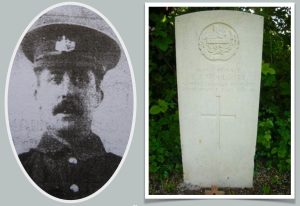1st Battalion, Gloucestershire Regiment

Frederick James Woolcott was born in Tewkesbury in 1878, the eldest son of (Albert) William Woolcott and Sophia Woolcott (formerly Peart).
Albert was a General Labourer who had been born in Tewkesbury whilst Sophia came from Woolstone near Gotherington.
Albert and Sophia had a total of 12 children, 10 of whom were still alive in 1911; the family lived in Fletchers Alley, Barton Street from 1891 to 1911.
Frederick ran foul of the law as a 13 year old when he was trapped by two policemen after the theft of fees from the British School in Barton Road; as a result he was sentenced to six strokes of the birch.
Ten years later his mother was fined 10s (50p), including costs, for an assault on Rose Peart who was her sister-in-law. In 1904, at the age of 15 or 16, Frederick was actually imprisoned for being drunk and disorderly.
Albert died in 1908 at the age of 53 and then Frederick’s younger brother, Thomas, died in 1911 aged just 18. At that time, Frederick lived with his widowed mother and worked as a Bricklayer’s Labourer whilst Sophia made ends meet as a Charwoman.
By 1901, Frederick had left home to live with his uncle and aunt John and Amy Peart at 8 North East Terrace whilst he worked as a Blacksmith’s Striker.
On 2 March 1901 it was reported that he had volunteered for service in South Africa with the 2nd Volunteer Battalion of the Gloucestershire Regiment.
Although he may well have served in that battalion, which was a Militia unit rather than a regular battalion, there is no evidence that he was one of the 14 men from the unit who served during the Boer War.
Frederick enlisted as a regular in the Gloucestershire Regiment in late 1914 or early 1915 and was posted to the 1st Battalion, arriving in France on 18 February 1915.
The battalion had been part of the original British Expeditionary Force and came under the command of the 3rd Infantry Brigade in the 1st Division.
In May 1915 Frederick was among those mentioned in a letter from Private Woodward who wrote that: ‘he is proud there are so many Tewkesburians with the 1st (Glosters), and they had experienced some very severe fighting’.
He mentioned the heavy fighting on 9 May (the Battle of Aubers), and the fortunate escape of the men of Tewkesbury. He says they ‘would be grateful for cigarettes, and a few papers would be very acceptable in the trenches, and suggests that any gifts should be addressed to one of the non commissioned officers named for distribution’.
In October 1915, the Register reported that Frederick had been wounded by being shot through the arm, almost certainly at the Battle of Loos (25 September to 18 October 1915).
The 1st Division, including the 1st Battalion, Gloucestershire Regiment remained on the Western Front for the rest of the war and took part in most of the major campaigns such as the Battles of the Somme 1916, Third Ypres 1917, the German Spring Offensive 1918 and the Last Hundred Days 1918.
For news of Frederick we have to wait until the crucial days of August 1918 to find that he was once again wounded in action. It was said that he was serving with the Royal Sussex Regiment but his medal records make no reference to any change of regiment; Frederick had been gassed but, tellingly, claimed that: ‘I am going on grand, having recovered my eyesight’.
After having apparently recovered, Frederick was transferred to the Labour Corps until he was demobilised and posted to the Class ‘Z’ Reserve on 29 April 1919. This class of reserve was established to enable trained men to return to civilian life but with an obligation to return to duty in the event of hostilities being resumed.
The Class ‘Z’ Reserve was abolished on 31 March 1920 and Frederick died soon afterwards on 25 August 1920.
His obituary in the Register suggested that his death was a result of being gassed; the record on the Soldiers of Gloucestershire Museum’s database does indeed give the reason for death as ‘Died of wounds’.
Private Frederick James Woolcott was buried in Tewkesbury Cemetery in a military grave; his name was added later to the Memorial to the Fallen in the normal way.
Frederick’s younger brother, Private Albert William Woolcott of the 10th Battalion Gloucestershire Regiment, survived the Battle of Loos in 1915 and the Battles of the Somme in 1916, despite being wounded.
Before that he had written a letter home about the death of Private Charles H Bailey of the same battalion: ‘before The War broke out we were great chums, he died a hero on the battlefield, doing his duty nobly for King and Country’.
Research by Graham Adams 9 November 2015 (with acknowledgement for research information provided by Malcolm Waldron)
